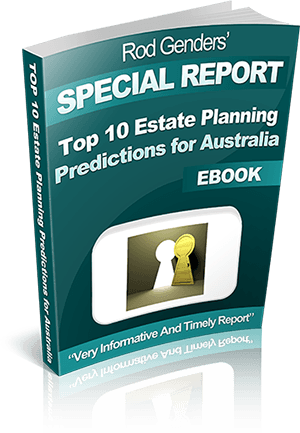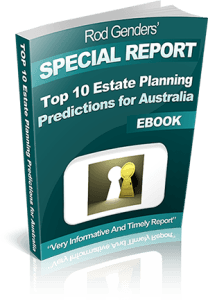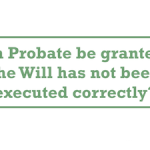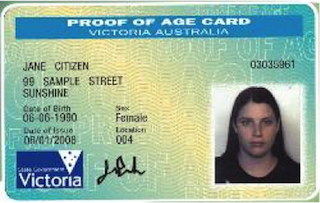Rod Genders is a senior Australian lawyer specialising in Wills and Estate Planning, Probate and Estate Administration, Trusts and Guardianship and Inheritance Claims and Contested Estates in South Australia. His boutique specialist law firm, which was founded on 1848, is one of the oldest and most respected in Australia. Rod is an international author and speaker. Rod is the 3rd generation of Genders in the law and has been practising specialised law since the mid 80’s. For over 10 years he served on the Council of the Law Society of South Australia and is a senior member of its Succession Law Committee. For 8 years Rod was a founding committee member of the South Australian branch of the London-based Society of Trusts and Estate Practitioners (STEP) and was the founding Chair of the international STEP Digital Assets Special Interest Group. For over 25 years Rod has chaired a private committee enquiring into the affairs of protected persons. He is a member of the Law Council of Australia, a member of the Notaries Society of South Australia and an associate member of the American Bar Association.
On 15 October 2009 the most senior tax-policy advisor to the Australian Federal Government, Dr Ken Henry (Chair – Australia’s Future Tax System Review Panel and Secretary to the Treasury) gave an Address to the Committee for Economic Development of Australia.
In that address he identified 6 areas of future opportunities and challenges governments will need to address in respect to taxation. At the very top of his list was: “the ageing of the population, posing challenges for the financing of retirement incomes and of increasing health and aged care needs”.
Dr Henry said that taxes levied on broader bases would be more efficient policy tools, probably more equitable and certainly more transparent ways of raising revenue. Without such tools, governments would otherwise be compelled to continue to rely on bad taxes to achieve their spending objectives.
The age pension was introduced by Labor prime minister Andrew Fisher in 1908 as a safety net for Australians in the last years of their life. When it was first established, the age for eligibility was set at 65 – when the average life expectancy for Australian men was 63. It was not expected that most people would live long enough to receive it, and those they did would not get it for very long.
With advancements in health care and medical science, our life expectancies have risen dramatically, and the cost of the age-pension has ballooned into the single largest federal program.
It cost $36 billion in 2013, almost 10 per cent of the entire Federal budget, a bill that has risen by $13 billion over the past decade as Australians became healthier and lived longer. Annual administration costs are estimated at $1 billion a year.
OK, OK – I admit this one is not directly related to estate planning. And I also freely concede this one is more speculative then my other predictions. However I stand by it.
At the moment, some employers do not have to withhold PAYG tax or SGC for some workers, ESPECIALLY if those workers are not classified as permanent employees: ie casual workers; workers who work below a threshold number of hours per week; workers earning less than a certain threshold amount of income; independent contractors.
There is an administrative burden for businesses to be the collection-agent for the Government, and so if a business can legitimately arrange its affairs to minimise that burden, it will probably do so. So… businesses might insist on categorising workers as independent contractors, and so leave the issues of SGC & PAYG to the worker to sort out.
Like most developed countries, Australia’s population is ageing as a result of sustained low fertility and increasing life expectancy. This has resulted in proportionally fewer children in the population and a proportionally larger increase in those aged 65 and over.
Over the 20 years between 1994 and 2014, the proportion of the population aged 65 years and over increased from 11.8% to 14.7%. This group is projected to increase more rapidly over the next decade, as further cohorts of baby boomers turn 65.
In the 12 months to 30 June 2014, the number of people aged 65 years and over increased by 118,700 people, representing a 3.6% increase.
We are living longer and accumulating greater wealth. This gives rise to the potential for more disputes arising on either incapacity or death.
Over the next 10 years, Australia will face significant challenges as it attempts to balance its books while enormous numbers of Baby-Boomers exit the scene. The State & Federal Governments (of all political persuasions) will need to make some difficult choices to address these challenges, and attempt to cling onto our desirable quality of life.
Nearly $24 billion has been lost to the Federal Government in just five years by a capital-gains tax discount which many economists claim rewards the rich and freezes out first homebuyers.
State Governments and authorities around Australia have introduced mandatory Verification of Identity (VOI) policies. These policies help to protect all the parties in a variety of legal and business transactions against fraud.
Mandatory VOI policies are now in place in South Australia, Victoria and Western Australia. Similar policies are set to be introduced in New South Wales in 2016, with the remaining states and territories likely to follow shortly.
This overlaps with anti-money-laundering legislation, and various banking & finance protocols and policies.
Australia is the only western democracy in the world not to have some form of death duty. The USA, Canada, England, Scotland, Ireland and New Zealand all have inheritance taxes.
Until the 1970’s each state and territory in Australia had some form of death duty or inheritance tax. But then Joh Bjelke Peterson as premier of Queensland abolished them in that state, and every other state government soon followed suit to remain competitive.
All State and Federal Governments are desperately looking to raise revenue in these difficult economic times, and every recent review of our tax system suggests that some form of inheritance tax will be back on the table.
























